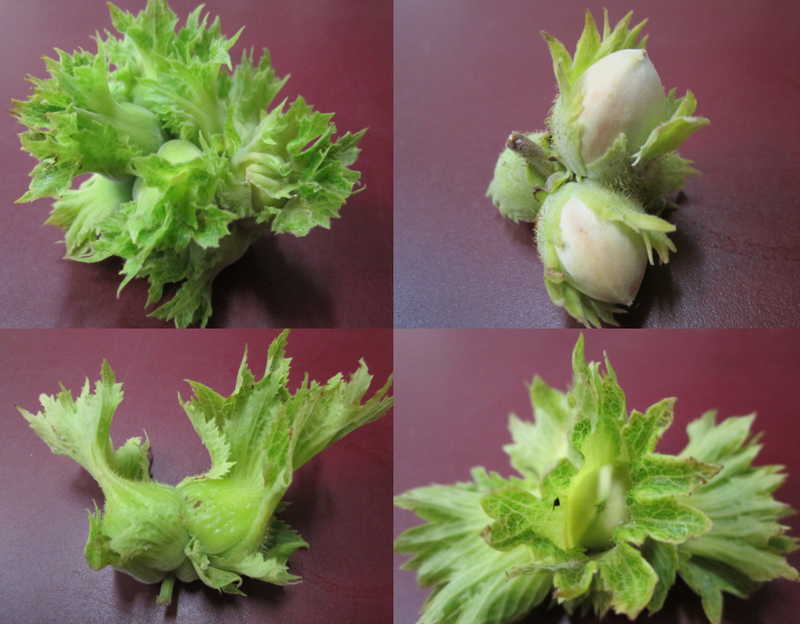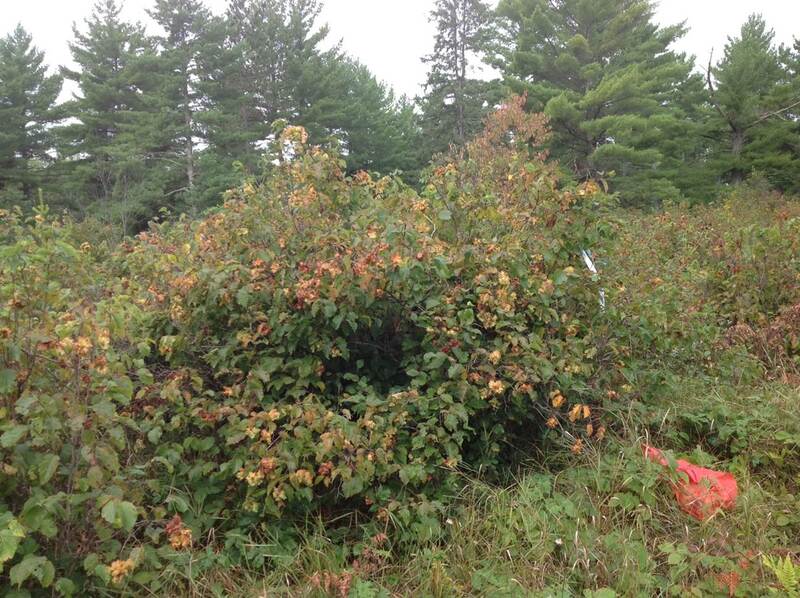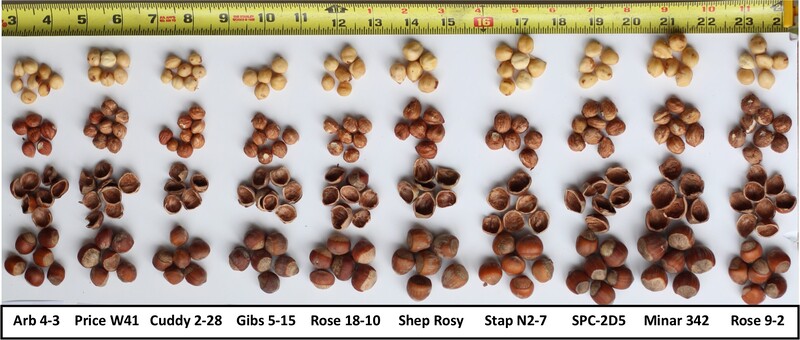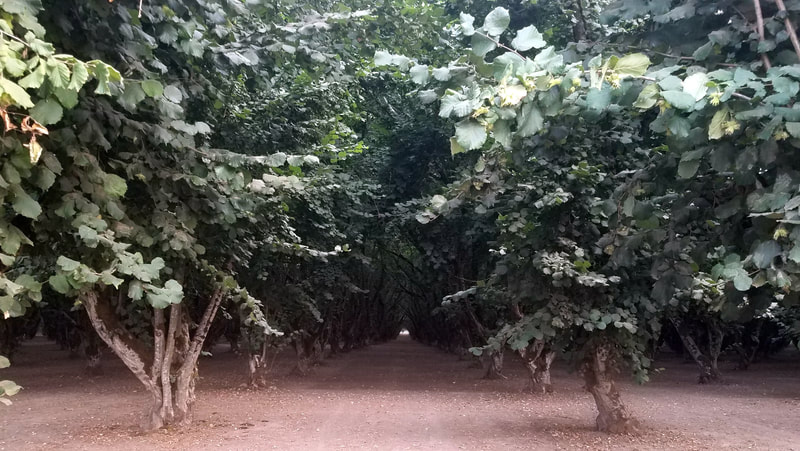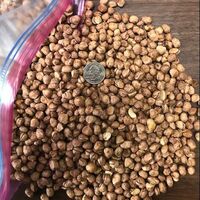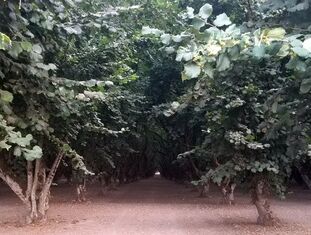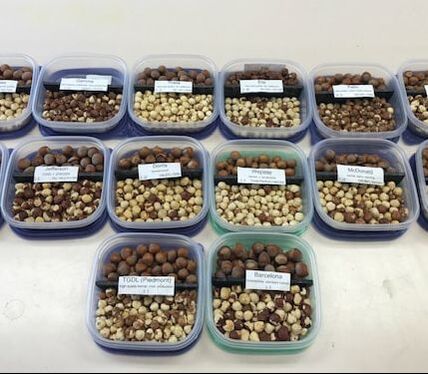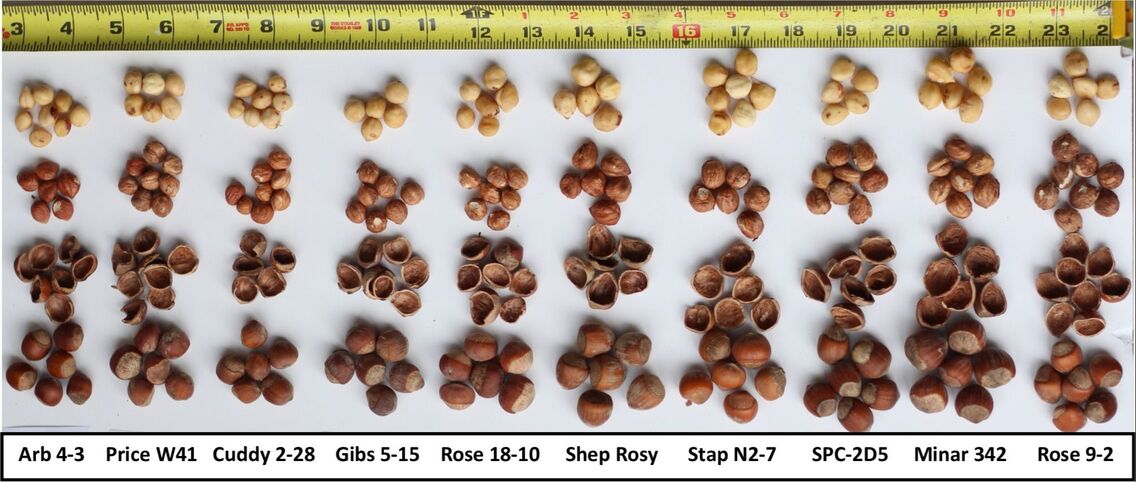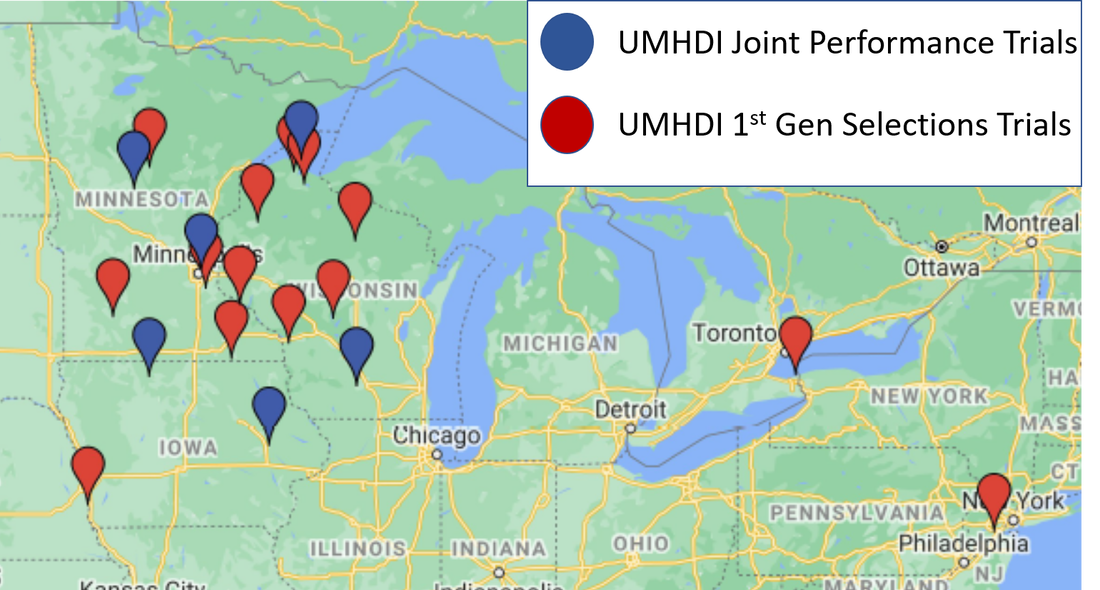Hazelnut Plants For the Upper Midwest
Click on a button or scroll down to learn more about hazelnut plants available for the Upper Midwest (and beyond).
Important Terms to Know
Before shopping for plants, it's important to have an understanding of some basic terminology so you know what you're buying. For more information about available hazelnut plants for the Upper Midwest be sure to read: Hazelnuts 101: Choosing Plants.
Seedlings are, quite simply, plants grown from seed. The term "seedling" is also used to refer to a young plant, but in the context of plant breeding, a seedling is a plant grown from seed, meaning the plant will have a unique genotype and phenotype. A planting of seedlings will be genetically diverse, and that diversity usually means some plants have the traits (disease resistance, high yields, tasty nuts) you want, but most plants will not. Beware of claims that seedlings will perform a certain way. There are different types of seedlings, depending on the parentage:
Open-pollinated seedlings have unknown mothers and fathers due mainly because the seeds are harvested from a bunch of different plants and mixed together. Most hazelnut plants grown in the Upper Midwest right now are open-pollinated seedlings from breeders and nurseries that collect seed from their best plants, mix them together, grow out the plants, and ship them to growers.
Half-sibling seedlings have one parent in common, but not the other. If you collected seed from a single hazelnut plant and grew out the seed all those plants would be half-siblings. It is possible many of those seed have the same father, but unless one is absolutely sure of where the pollen came from, the plants are considered to be half-siblings.
Full-sibling seedlings have the same mother and father and are derived from hand-pollinations or crossing blocks where all other pollen is excluded. Because the offspring share the same parents, the "family" of full-siblings can sometimes be uniform enough to support commercial production. Thus, one option being pursued by breeders in the Upper Midwest is finding high-performing full-sib families.
A hybrid plant is derived from a cross between two distinct parental lines or, with respect to hazelnuts, a cross between two different species, usually between a Corylus americana and a Corylus avellana plant. In the Upper Midwest, “hybrid hazelnuts” is used generically to describe any hazelnut plant with parentage from at least two different species.
A selection is a plant selected by a breeder as having promising traits. The term is generally used for promising plants that are in some stage of evaluation before the breeder is confident enough to release it to growers as a cultivar. Breeders will often use cultivar and selection interchangeably.
A cultivar is a plant derived from intentional selection or breeding with distinct and desirable traits. These traits are maintained through vegetative propagation. The term is used for plants with enough performance data across multiple locations and years to be confident in its performance. Cultivars are often protected by a patent, which prohibits vegetative propagation without a license. There are currently no proven hazelnut cultivars for the Upper Midwest, though that is rapidly changing.
Seedlings are, quite simply, plants grown from seed. The term "seedling" is also used to refer to a young plant, but in the context of plant breeding, a seedling is a plant grown from seed, meaning the plant will have a unique genotype and phenotype. A planting of seedlings will be genetically diverse, and that diversity usually means some plants have the traits (disease resistance, high yields, tasty nuts) you want, but most plants will not. Beware of claims that seedlings will perform a certain way. There are different types of seedlings, depending on the parentage:
Open-pollinated seedlings have unknown mothers and fathers due mainly because the seeds are harvested from a bunch of different plants and mixed together. Most hazelnut plants grown in the Upper Midwest right now are open-pollinated seedlings from breeders and nurseries that collect seed from their best plants, mix them together, grow out the plants, and ship them to growers.
Half-sibling seedlings have one parent in common, but not the other. If you collected seed from a single hazelnut plant and grew out the seed all those plants would be half-siblings. It is possible many of those seed have the same father, but unless one is absolutely sure of where the pollen came from, the plants are considered to be half-siblings.
Full-sibling seedlings have the same mother and father and are derived from hand-pollinations or crossing blocks where all other pollen is excluded. Because the offspring share the same parents, the "family" of full-siblings can sometimes be uniform enough to support commercial production. Thus, one option being pursued by breeders in the Upper Midwest is finding high-performing full-sib families.
A hybrid plant is derived from a cross between two distinct parental lines or, with respect to hazelnuts, a cross between two different species, usually between a Corylus americana and a Corylus avellana plant. In the Upper Midwest, “hybrid hazelnuts” is used generically to describe any hazelnut plant with parentage from at least two different species.
A selection is a plant selected by a breeder as having promising traits. The term is generally used for promising plants that are in some stage of evaluation before the breeder is confident enough to release it to growers as a cultivar. Breeders will often use cultivar and selection interchangeably.
A cultivar is a plant derived from intentional selection or breeding with distinct and desirable traits. These traits are maintained through vegetative propagation. The term is used for plants with enough performance data across multiple locations and years to be confident in its performance. Cultivars are often protected by a patent, which prohibits vegetative propagation without a license. There are currently no proven hazelnut cultivars for the Upper Midwest, though that is rapidly changing.
Hazelnut Species Overview
|
American Hazelnut (Corylus americana)
American hazelnut is native to the Upper Midwest and is found primarily on sandy soils in full sun, though it grows well on a wide range of soils. Plants can be high-yielding and nuts are generally small with thick-shells. Flavor is excellent. Seedlings are widely available from state Department of Natural Resources and private nurseries. Though no cultivars of American hazelnut are yet widely available, legacy selections such as 'Rush' or 'Winkler' are available from germplasm repositories. New selections are currently in evaluation by public and private breeders. American hazelnut is also being crossed with European hazelnut and promising hybrid cultivars are being propagated for release to growers as described below. |
Beaked Hazelnut (Corylus cornuta)
Beaked hazelnut is found throughout Wisconsin and is typically found in the understory of mature forest stands. The nuts are in husks with a distinctive snout or beak. The nuts are edible and tasty, but nut production is limited. As such, beaked hazelnut is not considered a potential crop species on its own, but has been used in breeding programs as a source of winter hardiness.
Beaked hazelnut is found throughout Wisconsin and is typically found in the understory of mature forest stands. The nuts are in husks with a distinctive snout or beak. The nuts are edible and tasty, but nut production is limited. As such, beaked hazelnut is not considered a potential crop species on its own, but has been used in breeding programs as a source of winter hardiness.
Asian/Siberian Hazelnut (Corylus heterophylla)
The Asian hazelnut is native to eastern Asia and grows as a bush to small tree. It is of interest to the Upper Midwest because of its winter hardiness. Like American hazelnut in North America, Asian hazelnut has been crossed with European hazelnut by Korean and Chinese breeding programs to produce promising new selections. In China, thousands of acres have been planted to the Ping'ou hybrids.
The Asian hazelnut is native to eastern Asia and grows as a bush to small tree. It is of interest to the Upper Midwest because of its winter hardiness. Like American hazelnut in North America, Asian hazelnut has been crossed with European hazelnut by Korean and Chinese breeding programs to produce promising new selections. In China, thousands of acres have been planted to the Ping'ou hybrids.
Turkish Tree Hazelnut (Corylus colurna)
The Turkish hazelnut is native to Europe and western Asia. It grows as a tree and does not sucker like other hazelnut species. The nuts are small and thick-shelled. As such, it is used primarily as a rootstock and in breeding programs and is not grown commercially. J.U. Gellatly hybridized Turkish tree hazelnut with European hazelnut to produce what he called "trazel" hybrids. Seedlings and layers from one of his trazels, `Faroka` are available from Grimo Nut Nursery.
The Turkish hazelnut is native to Europe and western Asia. It grows as a tree and does not sucker like other hazelnut species. The nuts are small and thick-shelled. As such, it is used primarily as a rootstock and in breeding programs and is not grown commercially. J.U. Gellatly hybridized Turkish tree hazelnut with European hazelnut to produce what he called "trazel" hybrids. Seedlings and layers from one of his trazels, `Faroka` are available from Grimo Nut Nursery.
|
European Hazelnut (Corylus avellana)
European hazelnut is native to Europe and Asia Minor and is the base of production for most of global hazelnut production. There are many commercial cultivars available, but limited winter hardiness and susceptibility to Eastern Filbert Blight limit them from being grown in the Upper Midwest. Newer releases of EFB resistant varieties from Rutgers University may be worth trying, though only in the southern areas in the Upper Midwest or immediately adjacent to the Great Lakes. |
European Hazelnut Cultivars
Landmark(TM) Series From Rutgers University
Rutgers has recently released four new European hazelnut cultivars with resistance to Eastern Filbert Blight: 'Raritan', 'Monmouth', 'Hunterdon', 'Somerset'. They are only recommended to USDA hardiness zones 6 and 7 and have not yet been trialed in the Upper Midwest. For European hazelnut cultivars to be hardy for the Upper Midwest, the vegetative plant (roots, stems, buds) must survive the coldest of winter days, and the male (catkins) and female flowers must survive the spring freezes and frosts. It is possible these new cultivars will survive the winters, but it is almost certain the male flowers will freeze in some years. If these plants are grown in the Upper Midwest they will need to be mixed with American hazelnuts or hybrids to provide a reliable pollen source. It is HIGHLY recommended that prospective growers read the Rutgers Hazelnut Production Guide before ordering or planting these cultivars. At this point, they should be considered for trial only in the Upper Midwest.
The Rutgers cultivars can be ordered from Foggy Bottom Farms in Columbus, New Jersey
Rutgers has recently released four new European hazelnut cultivars with resistance to Eastern Filbert Blight: 'Raritan', 'Monmouth', 'Hunterdon', 'Somerset'. They are only recommended to USDA hardiness zones 6 and 7 and have not yet been trialed in the Upper Midwest. For European hazelnut cultivars to be hardy for the Upper Midwest, the vegetative plant (roots, stems, buds) must survive the coldest of winter days, and the male (catkins) and female flowers must survive the spring freezes and frosts. It is possible these new cultivars will survive the winters, but it is almost certain the male flowers will freeze in some years. If these plants are grown in the Upper Midwest they will need to be mixed with American hazelnuts or hybrids to provide a reliable pollen source. It is HIGHLY recommended that prospective growers read the Rutgers Hazelnut Production Guide before ordering or planting these cultivars. At this point, they should be considered for trial only in the Upper Midwest.
The Rutgers cultivars can be ordered from Foggy Bottom Farms in Columbus, New Jersey
|
Oregon State University Cultivars
Oregon State University has a robust breeding program and has developed many cultivars over the years. However, their breeding program is for the Pacific Northwest and NOT the Upper Midwest. As such, the European hazelnut cultivars are not sufficiently winter hardy and most are susceptible to Eastern Filbert Blight (EFB). Even the new resistant releases with the 'Gasaway' resistance are not resistant to all the variable strains of EFB present in the Upper Midwest. Growers in the Fruit Belt of the Great Lakes, particularly in Ontario have been trialing many of the Oregon State cultivars, but have struggled with hardiness issues. The Hazelnuts in Ontario Factsheet provides an overview of European hazelnut cultivars in the context of Ontario's climate. |
Hybrid Hazelnuts - Seedlings
Growing hazelnuts from seed is relatively easy to do. Starting in the 1990s Badgersett Research Corporation, Forest Agriculture Enterprise, and others sold thousands of hybrid seedlings to early-adopter growers in the Upper Midwest (and beyond) with the hope that seedlings selected from their best plants would be productive enough to support commercial production. Although individual plants have produced exceptional yields of high-quality nuts, on average the plantings have been too variable and too low-producing to support commercial production. Hybrid seedlings can be purchased from the sources below and work well for hobby production, for breeding, as pollenizers, and as "learner" plants for those wanting to gain experience while waiting for the improved cultivars. Growing hazelnuts from seed remains an appealing approach given the low cost of nursery stock production, but it will take considerable time and effort to find full- or half-sibling families that are uniform and productive enough to support commercial production. In the meantime, growers wanting to improve per acre yields from seedling plantings can start with a high plant density and remove or replace the lowest producing plants as they mature.
Sources of Hybrid Hazelnut Seedlings
The following businesses sell seedling hazelnut plants for growers in the Upper Midwest. The UMHDI and its University partners make no claims, assertions, or endorsements as to the quality of the plants or businesses practices of the listed suppliers. To be listed on this page as a plant supplier contact Jason Fischbach.
Hausers Superior View Farm - Bayfield, WI
Hausers Superior View Farm is a 4th generation orchard and nursery operation location in Bayfield, WI. They sell open-pollinated seedlings from the Upper Midwest Hazelnut Development Initiative (UMHDI) breeding program, which are from seed collected from the best plants in the UMHDI's breeding plots. Because every plant comes from and individual seed, each plant will be slightly different. Recommended for hobby growers or as a border and pollinizer rows in commercial plantings.
Forest Agriculture Enterprises, LLC - Viola, WI
Carl Weschke was a private breeder working in River Falls, WI in the 1930s and 1940s with populations of American x European hybrids. Badgersett Research Corporation and then Forest Agriculture Enterprises (Forest Ag) established their own breeding populations with seed originating from the Weschke populations. Currently, Forest Ag sells open pollinated seedlings from the top performing plants in their breeding population as well as a full-sibling seedlings from a hybrid x hybrid cross. The full-sibling family has been tested at multiple sites in Wisconsin and results can be found here.
Experimental Farm Network - Minneapolis, MN
In cooperation with Badgersett Research Corporation, The Experimental Farm Network grows and sells open-pollinated half-sibling seedlings of high-performing mother plants personally selected by Philip Rutter, from a large expansion planting (7.5 acres, planted in 2003 in NW Illinois) of some of Badgersett’s most advanced breeding lines. Currently, EFN is selling 3-4 month old greenhouse grown plugs and also 1 year-old bare-root dormant seedlings.
Grimo Nut Nursery - Niagra-On-The-Lake, Ontario
Grimo sells half-sibling seedlings for the warmer regions around the Great Lakes (Fruit Belt) and seedlings intended for the colder climate of Canada and the Upper Midwest. Currently offered seedlings come from two of George Slate's selections NY616 (`Slate`) and NY398 ('Geneva'), J.U. Gellatly's 'Faroka' (a hybrid between European and Turkish hazelnut), and from a collection of promising hybrid, Asian and American selections.
Z's Nutty Ridge, LLC - McGraw, NY
Z's Nutty Ridge is currently offering open pollinated seedlings from their top plants, what they call "FingerLakes Abundant" seedlings, full-sibling seedlings from some controlled crosses, as well as half-sibling seedlings from one of their hybrid selections, `Nitka`.
Red Fern Farm - Wapello, IA
Red Fern Farm currently sells only hazelnut seeds, which are collected each fall from their top hybrid plants.
St. Lawrence Nurseries - Potsdam, NY
St. Lawrence offers seedlings from hybrid plants with `Skinner`, `Graham`, and `Winkler` in the parentage.
Twisted Tree Farm - Spencer, NY
Twisted Tree Farm sells both open pollinated hybrid seedlings and seed. Both come from NY and Badgersett-origin hybrid plants.
Nine Hazels Farm - Lake City, MN
Formerly Hazelnut Valley Farm run by Norm and Mary Erickson, Nine Hazels Farm is run by Paul and Sanna Mairet and Steven Goldsmith, with mentorship from Norm. Half-sibling hybrid seedlings are available for spring 2021. Starting in fall 2021, they will sell half-sibling seedlings from their top plants as well as seed nuts. Genetics are hybrid hazels originating from Badgersett Research Corporation. Email [email protected] to reserve seedlings or inquire further.
The following businesses sell seedling hazelnut plants for growers in the Upper Midwest. The UMHDI and its University partners make no claims, assertions, or endorsements as to the quality of the plants or businesses practices of the listed suppliers. To be listed on this page as a plant supplier contact Jason Fischbach.
Hausers Superior View Farm - Bayfield, WI
Hausers Superior View Farm is a 4th generation orchard and nursery operation location in Bayfield, WI. They sell open-pollinated seedlings from the Upper Midwest Hazelnut Development Initiative (UMHDI) breeding program, which are from seed collected from the best plants in the UMHDI's breeding plots. Because every plant comes from and individual seed, each plant will be slightly different. Recommended for hobby growers or as a border and pollinizer rows in commercial plantings.
Forest Agriculture Enterprises, LLC - Viola, WI
Carl Weschke was a private breeder working in River Falls, WI in the 1930s and 1940s with populations of American x European hybrids. Badgersett Research Corporation and then Forest Agriculture Enterprises (Forest Ag) established their own breeding populations with seed originating from the Weschke populations. Currently, Forest Ag sells open pollinated seedlings from the top performing plants in their breeding population as well as a full-sibling seedlings from a hybrid x hybrid cross. The full-sibling family has been tested at multiple sites in Wisconsin and results can be found here.
Experimental Farm Network - Minneapolis, MN
In cooperation with Badgersett Research Corporation, The Experimental Farm Network grows and sells open-pollinated half-sibling seedlings of high-performing mother plants personally selected by Philip Rutter, from a large expansion planting (7.5 acres, planted in 2003 in NW Illinois) of some of Badgersett’s most advanced breeding lines. Currently, EFN is selling 3-4 month old greenhouse grown plugs and also 1 year-old bare-root dormant seedlings.
Grimo Nut Nursery - Niagra-On-The-Lake, Ontario
Grimo sells half-sibling seedlings for the warmer regions around the Great Lakes (Fruit Belt) and seedlings intended for the colder climate of Canada and the Upper Midwest. Currently offered seedlings come from two of George Slate's selections NY616 (`Slate`) and NY398 ('Geneva'), J.U. Gellatly's 'Faroka' (a hybrid between European and Turkish hazelnut), and from a collection of promising hybrid, Asian and American selections.
Z's Nutty Ridge, LLC - McGraw, NY
Z's Nutty Ridge is currently offering open pollinated seedlings from their top plants, what they call "FingerLakes Abundant" seedlings, full-sibling seedlings from some controlled crosses, as well as half-sibling seedlings from one of their hybrid selections, `Nitka`.
Red Fern Farm - Wapello, IA
Red Fern Farm currently sells only hazelnut seeds, which are collected each fall from their top hybrid plants.
St. Lawrence Nurseries - Potsdam, NY
St. Lawrence offers seedlings from hybrid plants with `Skinner`, `Graham`, and `Winkler` in the parentage.
Twisted Tree Farm - Spencer, NY
Twisted Tree Farm sells both open pollinated hybrid seedlings and seed. Both come from NY and Badgersett-origin hybrid plants.
Nine Hazels Farm - Lake City, MN
Formerly Hazelnut Valley Farm run by Norm and Mary Erickson, Nine Hazels Farm is run by Paul and Sanna Mairet and Steven Goldsmith, with mentorship from Norm. Half-sibling hybrid seedlings are available for spring 2021. Starting in fall 2021, they will sell half-sibling seedlings from their top plants as well as seed nuts. Genetics are hybrid hazels originating from Badgersett Research Corporation. Email [email protected] to reserve seedlings or inquire further.
Hybrid Hazelnuts - Cultivars
Efforts to develop suitable hazelnut cultivars for eastern North America have been ongoing, but sporadic, since the early 1900s. The goal has been to combine the disease resistance and winter hardiness from cold-climate adapted species like Corylus americana, Corylus cornuta, and Corylus heterophylla with the yields, larger kernels, and thin shells of Corylus avellana. A detailed history of these breeding efforts by private and public breeders is provided in "Developing Hazelnuts for the Eastern US" by Molnar, Goffreda, and Funk. None of these prior efforts have resulted in proven cultivars for the Upper Midwest, though some of the legacy selections are still available in germplasm repositories and nurseries.
Breeding efforts for the Midwest by public and private breeders have intensified over the last 20 years and a number of promising cultivars are currently or will soon be available for growers as detailed below. Things are changing rapidly so check back often for the latest information.
Buyer Beware
Before purchasing plants, it is important to understand the risks inherent to cultivar development. It is relatively easy for a breeder or nursery to grow a bunch of seedling plants and choose the best one (a selection). However, that one plant must then be vegetatively propagated and evaluated across many different locations for at least a decade before having confidence in the plant's performance. Furthermore, the plant must have good enough traits (resistant to EFB, winter hardy, high yields, high kernel quality, etc.) to support economically viable production. Thus, before purchasing plants ask the nursery for information about how widely it has been tested and what is known about its performance at multiple locations.
Hybrid Hazelnut Cultivars and Sources
The following businesses sell hybrid hazelnut cultivars for growers in the Upper Midwest. The UMHDI and its University partners make no claims, assertions, or endorsements as to the quality of the plants or businesses practices of the listed suppliers. To be listed on this page as a plant supplier contact Jason Fischbach.
Breeding efforts for the Midwest by public and private breeders have intensified over the last 20 years and a number of promising cultivars are currently or will soon be available for growers as detailed below. Things are changing rapidly so check back often for the latest information.
Buyer Beware
Before purchasing plants, it is important to understand the risks inherent to cultivar development. It is relatively easy for a breeder or nursery to grow a bunch of seedling plants and choose the best one (a selection). However, that one plant must then be vegetatively propagated and evaluated across many different locations for at least a decade before having confidence in the plant's performance. Furthermore, the plant must have good enough traits (resistant to EFB, winter hardy, high yields, high kernel quality, etc.) to support economically viable production. Thus, before purchasing plants ask the nursery for information about how widely it has been tested and what is known about its performance at multiple locations.
Hybrid Hazelnut Cultivars and Sources
The following businesses sell hybrid hazelnut cultivars for growers in the Upper Midwest. The UMHDI and its University partners make no claims, assertions, or endorsements as to the quality of the plants or businesses practices of the listed suppliers. To be listed on this page as a plant supplier contact Jason Fischbach.
|
UMHDI 1st Generation Selections
The University of Minnesota and University of Wisconsin selected the best individual plants from plantings of Badgersett hybrid seedlings and have been evaluating them at five locations in the Upper Midwest since 2009. The best of these plants have been propagated for further evaluation in Joint Performance and on-farm trials. They are currently being propagated for sale to growers, but are not yet available. Watch this space for availability updates or sign up for our UMHDI Mailing List to receive periodic updates. |
|
UMHDI Joint Performance Trials
The Upper Midwest Hazelnut Development Initiative coordinates a series of cultivar performance trials across the Upper Midwest. The oldest of these were established in 2017 with new cultivars added each year as propagation allows. Trials include cultivars from the breeding programs outlined below. As performance information is collected it will be published here.
| |||||||
Hybrid Hazelnut Consortium
Rutgers University and Oregon State University have been working with the Nebraska Forest Service and Arbor Day Foundation to develop hazelnuts suitable for the great plains. They have released two cultivars and a third is in propagation.
OSU 541.147 `The Beast' is a 75% European/25% American hybrid. At sites in Nebraska and New Jersey it grows as a multi-stem tree with high yields. In the Upper Midwest it is currently being evaluated in the Joint Performance Trials.
`Grand Traverse` is a hybrid developed by Cecil Farris and is from a cross between 'Faroka' and an unknown European selection. Parentage is 75% European and 25% Turkish. `Faroka` is a "trazel" developed by J.U. Gellatly with parentage from European and Turkish selections. `Grand Traverse` has demonstrated resistance to EFB and produces European-quality nuts. It was included in the original UMHDI trials and is also in the Joint Performance Trials. Results suggest `Grand Traverse` is not adapted to the coldest regions of the Upper Midwest.
Sources of Consortium Cultivars
Foggy Bottom Farms in Columbus, New Jersey sells `The Beast'.
Great Plains Nursery in Weston, NE sells `The Beast` and `Grand Traverse`.
North American Plants, in McMinnville, OR is a tissue-culture nursery and is licensed to sell `The Beast` and `Grand Traverse`.
Rutgers University and Oregon State University have been working with the Nebraska Forest Service and Arbor Day Foundation to develop hazelnuts suitable for the great plains. They have released two cultivars and a third is in propagation.
OSU 541.147 `The Beast' is a 75% European/25% American hybrid. At sites in Nebraska and New Jersey it grows as a multi-stem tree with high yields. In the Upper Midwest it is currently being evaluated in the Joint Performance Trials.
`Grand Traverse` is a hybrid developed by Cecil Farris and is from a cross between 'Faroka' and an unknown European selection. Parentage is 75% European and 25% Turkish. `Faroka` is a "trazel" developed by J.U. Gellatly with parentage from European and Turkish selections. `Grand Traverse` has demonstrated resistance to EFB and produces European-quality nuts. It was included in the original UMHDI trials and is also in the Joint Performance Trials. Results suggest `Grand Traverse` is not adapted to the coldest regions of the Upper Midwest.
Sources of Consortium Cultivars
Foggy Bottom Farms in Columbus, New Jersey sells `The Beast'.
Great Plains Nursery in Weston, NE sells `The Beast` and `Grand Traverse`.
North American Plants, in McMinnville, OR is a tissue-culture nursery and is licensed to sell `The Beast` and `Grand Traverse`.
Grimo Nut Nursery, Niagra-On-The-Lake, Ontario
Ernie and Linda Grimo have been working to supply improved hazelnut material for both the warmer Fruit Belt region around the Great Lakes and the colder climate of central Canada and the Upper Midwest. They have a number of cultivars selected from their populations of Asian (Corylus heterophylla) hybrids and American (Corylus americana) hybrids. 'Northern Blais', 'Aldara', 'Andrew', 'Marion', 'Dermis', and `Frank' are in the Joint Performance Trials. Grimo also sells some of the legacy hybrids including 'Skinner', `Slate`, `Geneva`, 'Cheryl' (NY 110), and 'Linda' (NY 104).
Ernie and Linda Grimo have been working to supply improved hazelnut material for both the warmer Fruit Belt region around the Great Lakes and the colder climate of central Canada and the Upper Midwest. They have a number of cultivars selected from their populations of Asian (Corylus heterophylla) hybrids and American (Corylus americana) hybrids. 'Northern Blais', 'Aldara', 'Andrew', 'Marion', 'Dermis', and `Frank' are in the Joint Performance Trials. Grimo also sells some of the legacy hybrids including 'Skinner', `Slate`, `Geneva`, 'Cheryl' (NY 110), and 'Linda' (NY 104).
Z's Nutty Ridge, LLC - McGraw, NY
Z's Nutty Ridge in McGraw, NY has been evaluating a collection of hybrid hazelnuts, primarily American x European hybrids from Badgersett Research Corporation. `Nitka` is a European-looking selection that has survived the New York winter and has shown resistance to EFB. It is not yet in the Joint Performance Trials, thus performance in the Upper Midwest is not yet known.
Z's Nutty Ridge in McGraw, NY has been evaluating a collection of hybrid hazelnuts, primarily American x European hybrids from Badgersett Research Corporation. `Nitka` is a European-looking selection that has survived the New York winter and has shown resistance to EFB. It is not yet in the Joint Performance Trials, thus performance in the Upper Midwest is not yet known.
